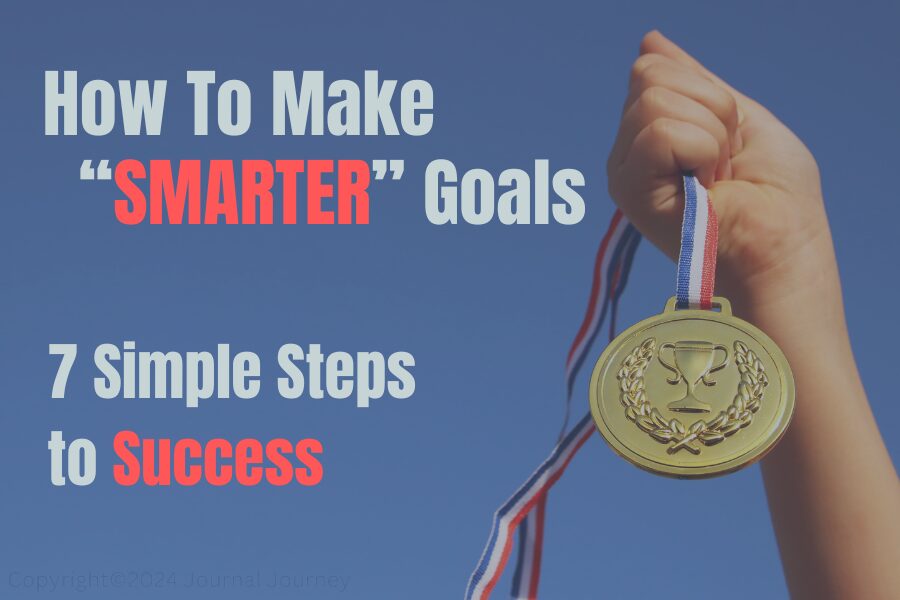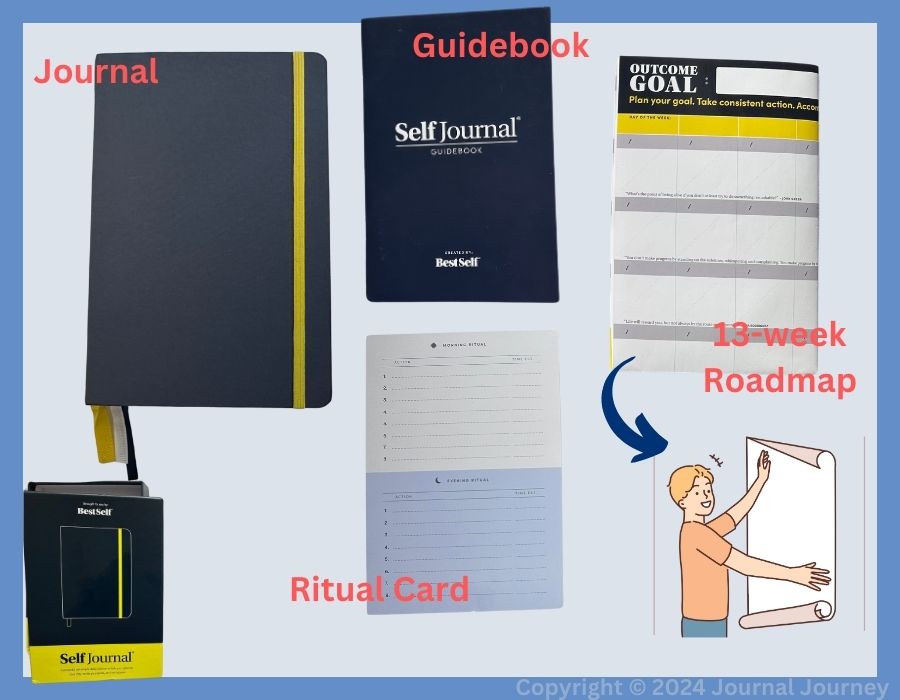Do you ever feel like your goals just slip through your fingers year after year?
You’re not alone.
Setting legacy type of goals is easy,
but achieving them takes a strategic approach.
That’s where SMARTER goals come in!

Let’s go through what SMARTER goals is,
then look through real examples
that would be helpful for you to think of yours.
Let’s right dive-in,
What is SMARTER Goals?
SMARTER stands for Specific, Measurable, Achievable, Relevant, Time-bound, Evaluate, Re-adjust.
S – Specific:
Goals should be clearly defined and detailed, not vague.
M – Measurable:
Goals should have concrete criteria to measure progress and know when you’ve achieved them.
A – Achievable:
Goals should be realistic and attainable within the resources and time available.
R – Relevant:
Goals should align with your overall objectives and priorities.
T – Time-bound:
Goals should have a clearly defined timeframe including a target date.
E – Evaluate:
Build in time to regularly evaluate progress and learnings against your goals.
R – Re-adjust:
Be flexible and willing to re-adjust goals based on learnings and changing circumstances.
This powerful framework ensures your goals are clear, actionable, and have a higher chance of success.
Goal Examples per each Life Domain
Let’s dive deeper with real-life examples
across various life domains:
There are various ways to categorize the life domains,
(usually 10-12 different categories depending on the books)
but here I use the ones from Full Focus,
which is 10 Life Domains like below:
1. Spiritual
2. Intellectual
3. Emotional
4. Physical
5. Marital
6. Parental
7. Social
8. Vocational
9. Avocational
10. Financial
1. Spiritual
| Specific: | Connect spiritually through nature walks/hiking |
| Measurable: | Take 2 nature walks per week for a minimum 30 minutes |
| Achievable: | Research suitable walking trails to visit near my home |
| Relevant: | Immersing in nature often leads to spiritual insights for me |
| Time-bound: | Aim to schedule 2 walks per week starting in April |
| Evaluate: | Each month, reflect on my spiritual state and any insights gained from nature. Make notes in a journal. |
| Re-Adjust: | If the desired spiritual connection is not happening, try longer walks or visit new locations. Walk with others for spiritual discussions. |
2. Intellectual
| Specific: | Improve my knowledge of machine learning and AI. |
| Measurable: | Read 2 books and take an online course by the end of the year. |
| Achievable: | Set aside 30 mins to read 3x per week. Enroll in the course in June. |
| Relevant: | This will help me stay up-to-date in my field as a software engineer. |
| Time-bound: | Start reading in March, take a course in June-August timeframe. |
| Evaluate: | Take notes on my learning and reflect on new concepts mastered. |
| Re-Adjust: | If the course is too advanced, find alternate introductory content. |
3. Emotional
| Specific: | Improve my emotional regulation skills |
| Measurable: | Practice mindfulness meditation for at least 15 minutes per day. Track progress in a journal. |
| Achievable: | Start with 5 minutes per day and gradually increase to 15 minutes over 2 months. |
| Relevant: | Being able to manage my emotions better will reduce stress and improve my overall well-being. |
| Time-bound: | Practice daily meditation starting March 1st, aim to reach 15 minutes per day by May 1st. |
| Evaluate: | Review my progress and emotional state monthly. Note insights and improvements. |
| Re-Adjust: | If I struggle to meditate, explore alternate grounding practices like yoga or breathwork. |
4. Physical
| Specific: | Improve my cardiovascular fitness. |
| Measurable: | Exercise 4x per week for 30 minutes with a target heart rate in the aerobic zone. |
| Achievable: | Start with 15-minute jogs and build up the duration weekly. |
| Relevant: | Better fitness will reduce my stress and risk of disease. |
| Time-bound: | Start workout schedule in April, reach 4x/week by June. |
| Evaluate: | Log workouts and monitor heart rate monthly. |
| Re-Adjust: | If too challenging, modify intensity and build more gradually. |
5. Marital
| Specific: | Strengthen my marriage through better communication. |
| Measurable: | Have a date night 2x per month and a 10-minute check-in daily. |
| Achievable: | Schedule date nights and check-in times in the calendar. |
| Relevant: | Improving my connection with my spouse will enhance intimacy. |
| Time-bound: | Initiate check-ins and date nights starting in March. |
| Evaluate: | Assess our communication and satisfaction monthly. |
| Re-Adjust: | Try a relationship counseling session if needed. |
6. Parental
| Specific: | Be more engaged with my kids and their interests. |
| Measurable: | Spend 30 mins of dedicated 1-on-1 time with each child per week. |
| Achievable: | Plan activities suited to each child’s interests. |
| Relevant: | Strengthening my bond with my kids will benefit our family. |
| Time-bound: | Start 1-on-1 time in February, aim for consistency |
| Evaluate: | Get feedback from my kids on our relationship. |
| Re-Adjust: | Find ways to improve conversation and activities with them. |
7. Social
| Specific: | Expand and diversify my social network. |
| Measurable: | Meet 2 new people per month through clubs, events, etc. |
| Achievable: | Research local groups and clubs to join based on my interests. |
| Relevant: | Meeting new people will expose me to new perspectives and opportunities. |
| Time-bound: | Join a club in March, start attending regularly |
| Evaluate: | Assess if I am connecting meaningfully with new people. |
| Re-Adjust: | Try different types of social settings if needed. |
8. Vocational
| Specific: | Gain skills to advance to a management role. |
| Measurable: | Complete leadership training program by year-end. |
| Achievable: | Talk to my manager about the training options available. |
| Relevant: | Developing leadership skills will prepare me for the next step in my career. |
| Time-bound: | Enroll in the program by June, and complete by December. |
| Evaluate: | Apply learnings on the job and get manager feedback. |
| Re-Adjust: | If the program is not relevant, look into alternate programs or on-the-job training. |
9. Avocational
| Specific: | Learn to play acoustic guitar. |
| Measurable: | Practice guitar 30 minutes per day and learn 5 new songs this year. |
| Achievable: | Break playing into 10-minute sessions. Find beginner-level songs to learn. |
| Relevant: | Playing guitar will be a fun creative outlet and stress reliever. |
| Time-bound: | Obtain a guitar in February. Aim to learn 1 new song per month. |
| Evaluate: | Record my practices to review progress. Identify areas for improvement. |
| Re-Adjust: | If struggling, take a few guitar lessons to improve technique. |
10. Financial
| Specific: | Reduce my credit card debt. |
| Measurable: | Pay off $2000 of debt this year. |
| Achievable: | Allocate $200 per month to pay down debt. |
| Relevant: | Becoming debt-free will reduce stress and eliminate interest payments. |
| Time-bound: | Start making $200 monthly payments in March. |
| Evaluate: | Review debt amount monthly. |
| Re-Adjust: | If needed, increase payment amount or find ways to trim expenses. |
Conclusion
We’ve got SMARTER goal ideas for every area of your life,
from strengthening relationships to crushing your fitness goals.
The process requires decent amount of deep introspection and critical thinking. But it is worth to try at least once a year.
Reference to Planners
Some planners are actively recommending to use SMART goal settings. You can read more below for more details.

